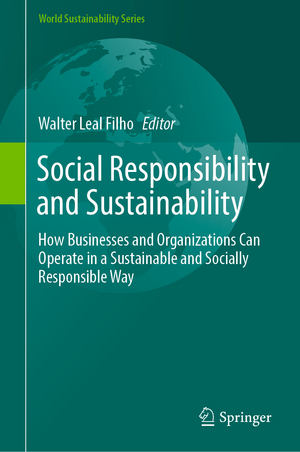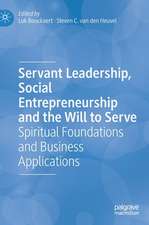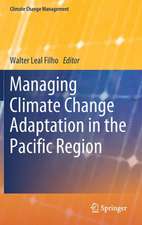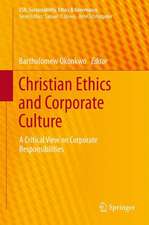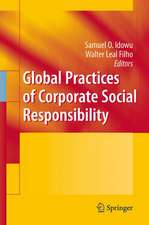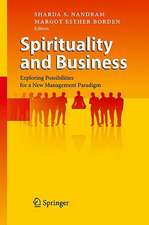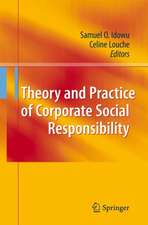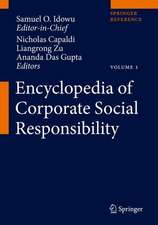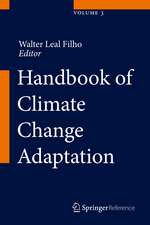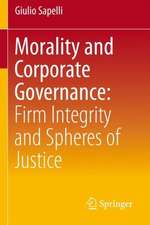Social Responsibility and Sustainability: How Businesses and Organizations Can Operate in a Sustainable and Socially Responsible Way: World Sustainability Series
Editat de Walter Leal Filhoen Limba Engleză Hardback – 25 ian 2019
Social responsibility and sustainable development are two different concepts, whose integration over the years has led to significant advances in the way enterprises see and perceive their operations. It is not only about policies or steps taken to meet legal requirements, but is also about social equality and environmental accountability, also bearing in mind the links with eco-efficiency, innovation, and the health and wellbeing of workers. According to ISO 26000, social responsibility is the responsibility of an organisation for the impacts of its decisions and activities on society and the environment, through transparent and ethical behaviour that:
a) contributes to sustainable development, including health and the welfare of society
b) takes into account the expectations of stakeholders
c) is in compliance with applicable law and consistent with international norms of behaviour
d) is integrated throughout the organisation and practised in its relationships.
But even though the relations between social responsibility and sustainability are strong, it is still necessary to encourage organisations to adhere to, or at least follow the principles of sustainable development in their operations, giving something back to the community. As such, there is a need for a better understanding of how social responsibility is related to sustainable development, and of the identification of processes, methods and tools that may help the integration of these two important elements. There is also a real need to showcase successful examples of how to structure behaviour and institutional practice in line with the sustainability challenges we face today.
Chapter [Reviewing the Stakeholder Value Creation Literature: Towards a Sustainability Approach] is available open access under a Creative Commons Attribution 4.0 International License via link.springer.com.
Din seria World Sustainability Series
- 18%
 Preț: 1241.73 lei
Preț: 1241.73 lei - 20%
 Preț: 882.19 lei
Preț: 882.19 lei - 18%
 Preț: 898.26 lei
Preț: 898.26 lei - 18%
 Preț: 1563.56 lei
Preț: 1563.56 lei - 18%
 Preț: 1015.38 lei
Preț: 1015.38 lei - 15%
 Preț: 654.77 lei
Preț: 654.77 lei - 18%
 Preț: 1668.06 lei
Preț: 1668.06 lei - 24%
 Preț: 747.95 lei
Preț: 747.95 lei - 18%
 Preț: 1116.09 lei
Preț: 1116.09 lei - 18%
 Preț: 1416.29 lei
Preț: 1416.29 lei - 18%
 Preț: 1561.82 lei
Preț: 1561.82 lei - 15%
 Preț: 648.05 lei
Preț: 648.05 lei - 18%
 Preț: 735.21 lei
Preț: 735.21 lei - 18%
 Preț: 2509.51 lei
Preț: 2509.51 lei - 15%
 Preț: 723.98 lei
Preț: 723.98 lei - 15%
 Preț: 650.19 lei
Preț: 650.19 lei - 18%
 Preț: 1244.89 lei
Preț: 1244.89 lei - 15%
 Preț: 649.87 lei
Preț: 649.87 lei - 18%
 Preț: 787.15 lei
Preț: 787.15 lei - 18%
 Preț: 1395.94 lei
Preț: 1395.94 lei - 15%
 Preț: 649.54 lei
Preț: 649.54 lei - 15%
 Preț: 652.17 lei
Preț: 652.17 lei - 18%
 Preț: 1555.51 lei
Preț: 1555.51 lei - 18%
 Preț: 1141.83 lei
Preț: 1141.83 lei - 18%
 Preț: 953.35 lei
Preț: 953.35 lei - 18%
 Preț: 1390.59 lei
Preț: 1390.59 lei - 15%
 Preț: 650.55 lei
Preț: 650.55 lei - 18%
 Preț: 915.48 lei
Preț: 915.48 lei - 18%
 Preț: 1240.16 lei
Preț: 1240.16 lei - 18%
 Preț: 909.33 lei
Preț: 909.33 lei - 15%
 Preț: 648.42 lei
Preț: 648.42 lei - 18%
 Preț: 905.85 lei
Preț: 905.85 lei - 18%
 Preț: 962.98 lei
Preț: 962.98 lei - 18%
 Preț: 1018.06 lei
Preț: 1018.06 lei - 18%
 Preț: 967.22 lei
Preț: 967.22 lei - 18%
 Preț: 1403.22 lei
Preț: 1403.22 lei - 18%
 Preț: 1017.92 lei
Preț: 1017.92 lei - 18%
 Preț: 965.97 lei
Preț: 965.97 lei - 18%
 Preț: 972.00 lei
Preț: 972.00 lei - 18%
 Preț: 1230.84 lei
Preț: 1230.84 lei
Preț: 961.86 lei
Preț vechi: 1173.01 lei
-18% Nou
Puncte Express: 1443
Preț estimativ în valută:
184.08€ • 191.47$ • 151.96£
184.08€ • 191.47$ • 151.96£
Carte tipărită la comandă
Livrare economică 15-29 aprilie
Preluare comenzi: 021 569.72.76
Specificații
ISBN-13: 9783030035617
ISBN-10: 3030035611
Pagini: 503
Ilustrații: IX, 519 p. 102 illus., 73 illus. in color.
Dimensiuni: 155 x 235 mm
Greutate: 0.92 kg
Ediția:1st ed. 2019
Editura: Springer International Publishing
Colecția Springer
Seria World Sustainability Series
Locul publicării:Cham, Switzerland
ISBN-10: 3030035611
Pagini: 503
Ilustrații: IX, 519 p. 102 illus., 73 illus. in color.
Dimensiuni: 155 x 235 mm
Greutate: 0.92 kg
Ediția:1st ed. 2019
Editura: Springer International Publishing
Colecția Springer
Seria World Sustainability Series
Locul publicării:Cham, Switzerland
Cuprins
Preface.- Part 1. Conceptual Frameworks.- Chapter 1. Reviewing the Stakeholder Value Creation Literature: Towards a Sustainability Approach.- Chapter 2. Innovative Approaches to Organisational Sustainability: State-of-the-art and Conceptual Framework.- Chapter 3. Sustainability and green project management skills: An exploratory study in the construction industry in Dubai.- etc.
Textul de pe ultima copertă
This book comprehensively describes social responsibility and sustainable development, with contributions from scientists and representatives from industry working in the field. The papers are innovative, cross-cutting and many share practice-based experiences, some of which may be replicable elsewhere. Prepared by the Inter-University Sustainable Development Research Programme (IUSDRP) and the World Sustainable Development Research and Transfer Centre (WSD-RTC), it reiterates the current need to promote social responsibility.
Social responsibility and sustainable development are two different concepts, whose integration over the years has led to significant advances in the way enterprises see and perceive their operations. It is not only about policies or steps taken to meet legal requirements, but is also about social equality and environmental accountability, also bearing in mind the links with eco-efficiency, innovation, and the health and wellbeing of workers. According to ISO 26000, social responsibility is the responsibility of an organisation for the impacts of its decisions and activities on society and the environment, through transparent and ethical behaviour that:
a) contributes to sustainable development, including health and the welfare of society
b) takes into account the expectations of stakeholders
c) is in compliance with applicable law and consistent with international norms of behaviour
d) is integrated throughout the organisation and practised in its relationships.
But even though the relations between social responsibility and sustainability are strong, it is still necessary to encourage organisations to adhere to, or at least follow the principles of sustainable development in their operations, giving something back to the community. As such, there is a need for a better understanding of how social responsibility is related to sustainable development, and of the identification of processes, methods and tools that may help the integration of these two important elements. There is also a real need to showcase successful examples of how to structure behaviour and institutional practice in line with the sustainability challenges we face today.
Social responsibility and sustainable development are two different concepts, whose integration over the years has led to significant advances in the way enterprises see and perceive their operations. It is not only about policies or steps taken to meet legal requirements, but is also about social equality and environmental accountability, also bearing in mind the links with eco-efficiency, innovation, and the health and wellbeing of workers. According to ISO 26000, social responsibility is the responsibility of an organisation for the impacts of its decisions and activities on society and the environment, through transparent and ethical behaviour that:
a) contributes to sustainable development, including health and the welfare of society
b) takes into account the expectations of stakeholders
c) is in compliance with applicable law and consistent with international norms of behaviour
d) is integrated throughout the organisation and practised in its relationships.
But even though the relations between social responsibility and sustainability are strong, it is still necessary to encourage organisations to adhere to, or at least follow the principles of sustainable development in their operations, giving something back to the community. As such, there is a need for a better understanding of how social responsibility is related to sustainable development, and of the identification of processes, methods and tools that may help the integration of these two important elements. There is also a real need to showcase successful examples of how to structure behaviour and institutional practice in line with the sustainability challenges we face today.
Chapter [Reviewing the Stakeholder Value Creation Literature: Towards a Sustainability Approach] is available open access under a Creative Commons Attribution 4.0 International License via link.springer.com.
Caracteristici
Highly interdisciplinary, covering social sciences, economics, business, education, and environmental sciences A comprehensive resource describing social responsibility A sound basis to promote sustainability among enterprises, universities and bioeconomy
